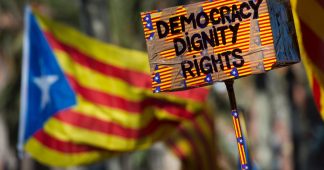Question: What are the principal grievances that induce a significant part of the Catalonian people to demand separation from Spain?
Answer: To understand the current situation in Catalonia it is necessary to look at history. At the end of the Middle Ages there were in the Iberian peninsula four Christian kingdoms: Aragon, Castile, Navarre and Portugal. Catalonia was part of the kingdom of Aragon, which had a “confederal” structure whereby the principality of Catalonia possessed its own laws and institutions.
In 1469 Fernando II of Aragon married Isabel of Castile, joining the two kingdoms under a single crown. Each kingdom retained its own laws and institutions. Spain was not a unitary kingdom and the kings were not called kings of Spain but “the King of Aragon, the King of Castile, the King of Navarre, the count of Molina, …”.
In Catalonia the situation changed in 1714. In the war of succession for the throne of Spain the crown of Aragon, including Catalonia, supported Charles of Habsburg against Philip of Anjou, who was supported by the crown of Castile. Charles of Habsburg lost the war and that brought about the disappearance of the crown of Aragon and all its laws and institutions. Catalonia became a territory like any other under the crown of Castile.
By contrast, the Basque Country retained its own laws and institutions until the mid-nineteenth century, when they were radically changed as a result of the wars of succession to the Spanish crown, called the Carlist wars, where the Basque country aligned itself with the losing side.
Catalans have always had a feeling of identity as a people. In the second half of the nineteenth century the proposals to set up a federal state in Spain came from Catalonia. In 1931, when the republic was proclaimed in Spain, the Catalan Republic was proclaimed at the same time. Between 1932 and 1939 Catalonia had a statute of autonomy with broad powers.
The Francoist epoch, when among other forms of oppression, languages other than Spanish were prohibited, was one of darkness for all the peoples and nations of Spain.
After the death Franco (1975), with the process of democratization of the structures of the state, the right to self-determination of the nations that comprise Spain was one of the subjects on the table, and even the PSOE recognized this eventually. The nations were Catalonia, Galicia and the Basque Country.
However, due to the power of the army and other Francoist institutions, the constitution of 1978 did not recognize the right to self-determination but posited an indissoluble unity of the Spanish Nation. That is, it defined Spain as a single nation, not a nation of nations. The constitution recognized the so-called nationalities (Catalonia, Galicia and Basque Country) and opened the door to the autonomy of territories such as Murcia or La Rioja that had never had had their own identity.
In 1979 Catalonia agreed with the State on a statute of autonomy which gave it wide powers in education, internal organization and other areas. But the State retained the power to levy and collect taxes. This means that Catalonia is at the mercy of the economic contributions decided on by Madrid for the purpose of financing its autonomy. In the area of finances Catalonia has remained on the same level as the autonomous territories without their own language and cultural traditions. This is not the case for the Autonomous Community of the Basque Country and the Autonomous Community of Navarre, since they collect taxes directly and then hand over part of them to Madrid.
One of the roots of the current situation is to be found in this lack of financial autonomy. Catalonia has little capacity, for example, to decide which road infrastructures to invest in. Madrid decides. As a result, the Barcelona airport is subordinate to Madrid’s, the Mediterranean railway corridor is not built, the high-speed train arrived late at Barcelona, etc. Meanwhile in other regions of the state, airports are built from which and to which no airplanes fly, high-speed lines are built that do not have passengers, and freeways which hardly anyone uses.
In addition, there is contempt on the part of certain sectors of Spanish society for the Catalan language and culture. Moreover, a recentralizing process had started in Spain by the middle of the first decade of the 2000s. Madrid is beginning to limit the decision-making capacity of the autonomous communities.
In 2003 a major change took place in Catalonia. The CiU, the traditional party of the Catalan nationalist bourgeoisie, which had been governing since 1978, lost power. An agreement between the Partit dels Socialistes de Catalunya (a subsidiary of the PSOE, but federalist and very Catalanist), Esquerra Republicana de Catalunya (a leftist independence party) and Iniciativa per Catalunya – El Verts (an ecosocialist movement where federalist and pro-independence sectors coexist) formed a coalition government which among other things decided to initiate the process of writing of a new statute of autonomy, since they thought that the old one didn’t match the reality of Catalan society at that time.
In the campaign for the Spanish general elections of 2004 Rodríguez Zapatero, candidate of the PSOE, made the promise that he would respect the text for the new statute of autonomy that the Parliament of Catalonia approved. Unexpectedly Zapatero won the elections, largely because of the magnificent outcome obtained in Catalonia. The text of the new statute approved by the Parliament of Catalonia (120 votes in favour and 15 against) was submitted to the Congress of Deputies in Madrid for discussion and ratification so as to become law. Zapatero went back on the promise he had given under pressure from the Jacobin wing of his party and the text of the statute reduced the level of autonomy given to Catalonia, along with identity references such as calling Catalonia a nation and prescribing the duty to know the Catalan language.
Nevertheless, the text that emerged from the Congress of Deputies was approved by referendum on June 18, 2006, where, curiously, both Esquerra Republicana de Catalunya and the Popular Party demanded a negative vote.
Simultaneously, the Popular Party initiated throughout Spain a collection of signatures against the Catalan statute and brought the text to the Constitutional Court. This court, in 2010, partly vindicated the PP and further reduced the scope of the statute of autonomy approved in the referendum, a very paradoxical situation in an alleged democratic state.
From that point on, the position of Catalan society towards independence began to change. A position that had the support of less than 20% of Catalans started to become stronger and stronger, and the sense of disaffection towards Spain increased. On the other hand between 70 and 80% of Catalans believed that the future of the Catalans had to be decided by Catalans themselves. In other words Catalonia had the right to secede or secure self-determination.
In 2012 the government of Catalonia, in the hands of the CiU again, tried to negotiate a financial pact with the PP government in Madrid. But the PP had the absolute majority and had no interest in negotiating a real deal with Catalonia. The PP therefore gave the Catalan government a vague, non-binding answer. This led the party of the Catalan bourgeoisie to put aside their traditional position of seeking accommodation in Spain and take a pro-independence position.
The national day of Catalonia (Diada) in 2012 was the turning point in the process. About one million people in a population of 7 million went out to demand that Catalonia be a new state in Europe. Participation in later Diadas has been of similar strength.
Faced with the political problem that a significant part of Catalan citizens wanted to set up an independent state, the PP government took a very tough position, refusing dialogue and negotiation and placing “legality” before democratic legitimacy. For the PP the unity of Spain is something that cannot be discussed. It is something higher than the will of citizens.
During the four years the PP had the absolute majority, it manoeuvred to shape the Spanish judicial system around both its ideology and its way of understanding democratic principles, placing like-minded people in key positions and endowing the Constitutional Court with powers not customary in the corresponding courts of truly democratic truly democratic states. The Constitutional Court is under the rule of conservative judges.
The PP is now using that judicial system to try to abort the October 1 referendum with measures such as arresting members of the government of Catalonia, issuing summonses to more than 700 pro-independence majors and banning conferences and meetings. The PP government is crossing the red lines of a democratic state. Spain today is as democratic as Turkey.
Question: People who support the independence of Catalonia invoke the right of self-determination. What is the principal threat, in today’s conditions, to this self-determination: the Spanish state, the international dictatorship of financial capital, the anti-democratic and neoliberal management of all of Europe by a Brussels bureaucracy, at the service of finance? The majority of decisions affecting Europeans are after all taken in Brussels, by unelected officials, not in Madrid or other European capitals.
Answer: The fight in Catalonia today is arguably not only for the right to decide but also for the defence of basic democratic rights. Podemos sees this clearly. PSOE neither knows nor answers.
The social aspect of the Catalan process is undeniable. The policy of eroding the social and economic rights that the PP has applied, carrying it out with the justification of the economic crisis, has led broad layers of the Catalan popular classes to supporting independence, the creation of a new state so as to be able to aspire to a more just and egalitarian society.
It is clear that neither Brussels and nor the European chancelleries are very fond of the idea of a referendum on self-determination in Catalonia, but with the antecedents of Quebec and, above all, Scotland they cannot take a belligerent stance against it. The conception of both the world and democracy espoused by Spanish nationalism, which at heart is Castilian nationalism, is the greatest obstacle to self-determination in Catalonia. In any case, in view of the antidemocratic drift of the Spanish government and the consequences it may have from the point of view of stability within the Union, Europe will probably be forced to intervene in some way to avoid major evils . Merkel may have to oblige Rajoy to agree to a Catalan referendum.
Question: Some people criticize the movements for the independence of Catalonia and other regions as representing a kind of “nationalism of the richest”, not so much the wish to resist national repression, but to enjoy a relatively better economic position than other regions. How would you comment on that? What are Catalans’ proposals for the other peoples and nations of Spain and Europe?
Answer: Creations such as Padania and the ‘nationalist’ movements that support them could be seen as the ‘nationalism’ of the rich. This is the case neither of Catalonia nor of other nations and historical regions of Europe. I do not think that Corsica, Sardinia, Galicia or Wales can be considered rich nations.
Catalonia has a clear cultural and historical identity. (To digress briefly, from my point of view the argument for becoming independent is to be derived not from history but from the will of the citizens). Catalonia’s citizens feel they are participating in a different social reality, neither better nor worse than any other. But Catalonia is also a rich industrial region when compared to others in Spain, and through its contributions to the Spanish finances it has been and is in solidarity with the poorest regions. It is true that there is a feeling of mistreatment on the part of Madrid with respect to other regions in terms of infrastructures. This seems logical when you bear in mind that Catalan contributions go towards building a high-speed train line to Cuenca, a city of 55,000 inhabitants, which is/was used (it is already closed) by an average of seven passengers a day and when overall railway infrastructure is obsolete because Madrid does not invest in it, or when airports are built that do not have flights to or from them or when there are highways parallel to high quality national roads with little traffic on them and when in Spain generally there are roads collapsing.
Question: What is the situation in the other regions of Spain. What is your prognosis for events in Catalonia?
Answer: Making a prognosis of what will happen in Catalonia is very difficult. The will in Catalan society to be able to decide its future is a reality. Laws or repression will not break that will. The PP can prevent the October 1 referendum from being held. But the political problem will remain and political channels must be used to solve it. I believe that in Catalonia there will be a referendum on self-determination because, as constitutional law professor Pérez Royo says, recognition of the right to decide in Catalonia is now a sine qua non for solving the Catalan ‘problem’.
If the Spanish left were sufficiently intelligent it would realize that a self-determination solution to the Catalan problem would put an end to the regime of 1978, which was, in certain aspects, a continuation of Franco’s regime. Furthermore, it would bring the possibility of establishing a truly democratic and republican regime in Spain. The progressive changes in Spain have always come from the periphery, never from the centre. It seems that in the most recent period it is Podemos that has seen the light!
* Dr. Inaki Irazabalbeitia Fernandez has worked for the revitalisation of Basque language, he has been editor of Elhuyar science magazine (1983-1990), CEO of the Elhuyar Foundation (1995-2003), CEO of Eleka Language Engineering (2006-2011) and member of the Board of Trustees (2005-2011). He was General Director of the Basque Summer University NGO (1987-1991) and member of the Board of Directors (1983-2008). He published several literature works and numerous articles on both science communication and Basque language revitalization. He is a member of the Royal Academy of the Basque Language and participates actively in the committees of Exo-onomastics and Science and Technology dictionary. He was member of the European Parliament in the Greens-EFA group (2103-2104). Inaki is member of the board of Aralar party, director of Ezkerraberri Foundation and Honorary Member of the European Free Alliance.
The interview was taken by Dimitri Konstantakopoulos











